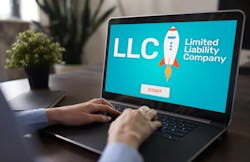Single member LLCs are one of the most audited entities. As such, the owners of these LLCs must have the foresight to adapt practices which can withstand the scrutiny of governmental authorities. Despite the tremendous daily demands on a contractor of operating their business, it's clear that implementing specific strategies can give an owner peace of mind even in the event of any financial or tax-related inquiries.
1. Receipts, receipts, receipts
First and foremost, make sure to keep and properly store all business receipts, with no exceptions. Vendor payments have been moving to online systems such as Zelle, Venmo and Cash apps. Providing statements to show these payments were paid to a person, email or telephone number is not enough. As a business owner, you must provide proof that every payment being claimed has been made for a legitimate business expense. Ink on receipts can fade over time When storing receipts, we recommend scanning them and storing them on a computer with a backup copy on an external drive or USB. The bottom line is that it is always the responsibility of the business owner to prove the legitimacy of their expenditures.
2. Always choose the correct labor allocation
Business owners must always ensure that they correctly allocate their hired labor sources. To put an exclamation point on why this is so important, we share here a cautionary tale. We recently represented a contractor in a worker compensation audit. They were asked to provide copies of the W-2s and 1099s for all employees and contractors. The business did not have any W-2s to provide but was able to provide the 1099s for the people he hired. When asked for invoices and Certificates of insurance (COI) for the recipients of the 1099s, the owner was ultimately unable to provide the COIs. The failure to provide the documents resulted in a $61,000 liability to the business.
There are guidelines to determine whether someone should be characterized as an employee or contractor that can be found at: www.irs.gov/businesses/small-businesses-self-employed/independent- contractor-self-employed-or-employee
3. Showing losses consistently
Some business owners are simply tax averse. It's understandable that after working so hard to create a profitable business, some owners are reticent to hand over money to the IRS, State, City, or other local taxing agencies. However, the law is the law. Reporting losses for an extended period of time is an enormous red flag for the IRS and other taxing authorities. Businesses exist to earn revenue. If you are still operating after years of losses, the IRS has a basis for concern about the legitimacy of the business, and in fact, whether you are pursuing a hobby or operating a business.
Another concern for business owners showing years of losses is the ability to obtain financing. Losses signify the inability to cover the expenses of the business. While there are ways around this, it is an uphill battle. If you find yourself in this situation, it's wise to consult a financial professional to help you create a viable, actionable plan.
4. Making estimated tax payments
When single-member LLCs report profits for a given year, it may result in tax liabilities for the owner; and if the owner has a tax liability for one year, they may be required to make estimated tax payments for the following year. If there is a tax liability in the second year, the owner may be fined a Penalty: "Failure to make estimated tax payments". Each owner’s case is different and we advise business owners to consult with a reputable tax professional to provide practical advice and tax planning services.
If you would like more information, reach out to us at lekmanagementinc.com/contact/.
Founder and CEO of LEK Management Inc., Lynn Karam has two decades of experience in finance, operations, and strategic planning. Karam is an Enrolled Agent authorized by the United States Department of the Treasury to represent clients who are undergoing an audit and to negotiate with the IRS on her clients’ behalf. Her success rate in resolving even the most challenging of IRS scenarios has become the cornerstone of her success. As CEO, Karam uses her financial expertise to establish sustainable strategies that result in significant business growth for her clients.
